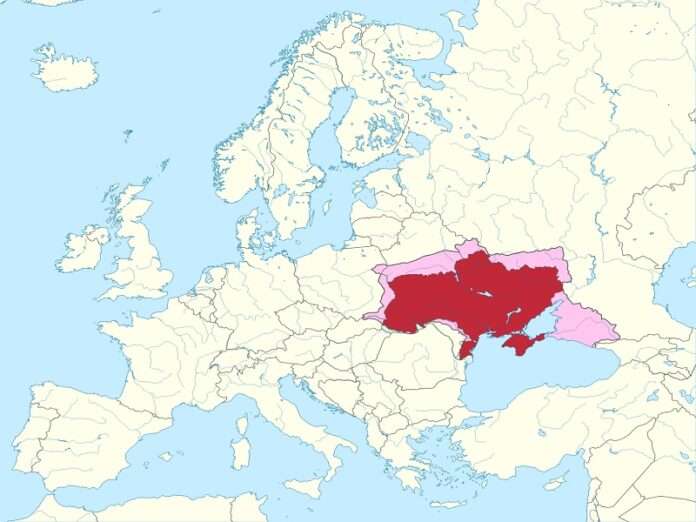Ukraine’s sneak attack against Russia’s Kursk Region is widely interpreted by analysts as a desperate attempt to divert its foes’ forces from the Donbass front, but there are also unstated political objectives that are being advanced by it too. Few were aware of it at the time, but Zelensky signed a relevant decree in late January where he strongly implied the revival of territorial claims to Russian border regions that were either occupied or claimed by the short-lived “Ukrainian People’s Republic” (UPR).
Some of these areas importantly fall within modern-day Bryansk, Kursk, Belgorod Regions, which are at the forefront of what might turn out to be a larger Ukrainian offensive if Kiev expands the scope of its attack to include Kursk’s two neighboring regions like some speculate that it’s considering. As for the other areas, they’re far behind the Donbass front lines in modern-day Voronezh, Rostov, and Krasnodar Regions and are therefore impossible to threaten through any ground force unlike the aforesaid three.
The political method behind what’s being presented as Ukraine’s military madness (and not without reason considering how counterproductive this could ultimately prove to be) is therefore to assert its tacitly revived claims from earlier this year. This is aimed at boosting morale at home and countering Russia’s international messaging. The first is self-explanatory while the second is about reminding the world of the UPR’s brief existence and associated claims to modern-day Russian territory.
The gradual revival of Russia’s historical claims to some of the land within Ukraine’s pre-2014 borders throughout the course of this decade-long conflict has hitherto only been responded to by Kiev with defensive pleas to international law but it now seems to be taking a more offensive dimension. Zelensky’s January decree can be seen in hindsight as laying the unstated political basis for what the Washington Post reported in May 2023 were his plans from the start of that year for invading Russia.
These goals aren’t being explicitly declared because they could discredit Ukraine’s abovementioned pleas to international law in response to Russia’s evolving territorial claims, plus the failure to achieve them after they’re declared could discredit Zelensky at home even more than he already is. Nevertheless, his country’s propagandists and their allies abroad are already trying to give Russia “a dose of its own medicine” by trolling it with claims of “People’s Republics” in Belgorod and Kursk Regions.
For as “clever” of a move as Kiev might consider these interconnected political-military-propaganda offensives to be, they risk backfiring by reminding Poles that Ukraine might one day resort to similar means for asserting the UPR’s claims to modern-day parts of their country. This was warned about here in June, which analyzed the Polish President’s veto of a bill recognizing Silesian as a regional language on the partial pretext that it could endanger national identity with implied implications for national unity.
The preceding analysis referenced Zelensky’s January decree, which can now be seen as the grounds for tacitly reviving the UPR’s claims ahead of this month’s sneak attack against Russia’s Kursk Region. This isn’t to hint that a similar such operation might soon be launched against Poland, but just to draw attention to the fact that militant irredentism is an emerging trend in Ukraine at this crucial point in the conflict, which might potentially inspire extremists to act unilaterally in the western direction.
As it becomes obvious that the implied revival of the UPR’s territorial claims to Russia (and possibly also Belarus depending on whether their border crisis escalates) won’t amount to anything, it’s possible that some ultra-nationalists might redirect their sights westward. This could become more likely if there’s a perception that Poland either “hasn’t done enough” to help Ukraine or has “abandoned” it if Russia achieves a military breakthrough (such as refusing to dispatch uniformed troops to stop the advance).
All told, the political method behind Ukraine’s military madness in Russia’s border regions aligns with the “logic” of its leadership, which is becoming increasingly desperate due to continued losses in Donbass and therefore resorting to more ultra-nationalism than usual for boosting morale at home. Some members of society might interpret this as a signal to openly express their Polonophobia and even carry out attacks within the Polish lands that the UPR claimed as its own, which could worsen bilateral ties.
To be clear, this remains unlikely for now, but it also can’t be confidently ruled out either considering how fast and far the state’s latest ultra-nationalist messaging might travel through society. Ukrainians are already more ultra-nationalist than anytime since the Nazis’ invasion of the USSR, after which they then genocided Russians, Jews, and even Poles. With Zelensky blowing the dog whistle that the UPR’s territorial claims are now informally being revived, some might therefore soon return to targeting Poles.







